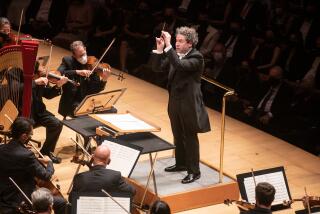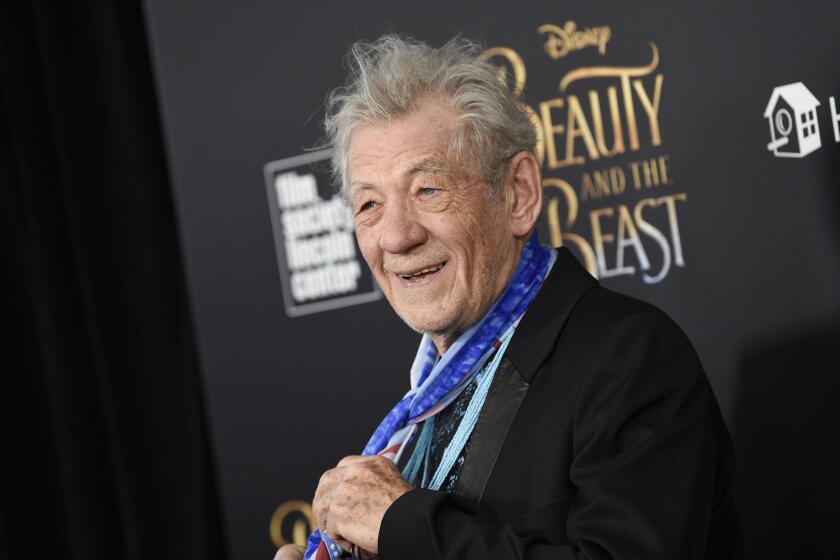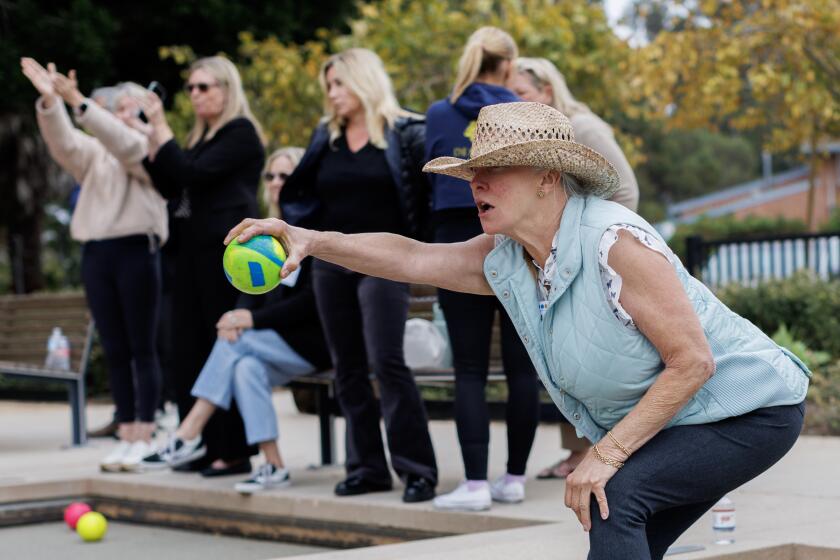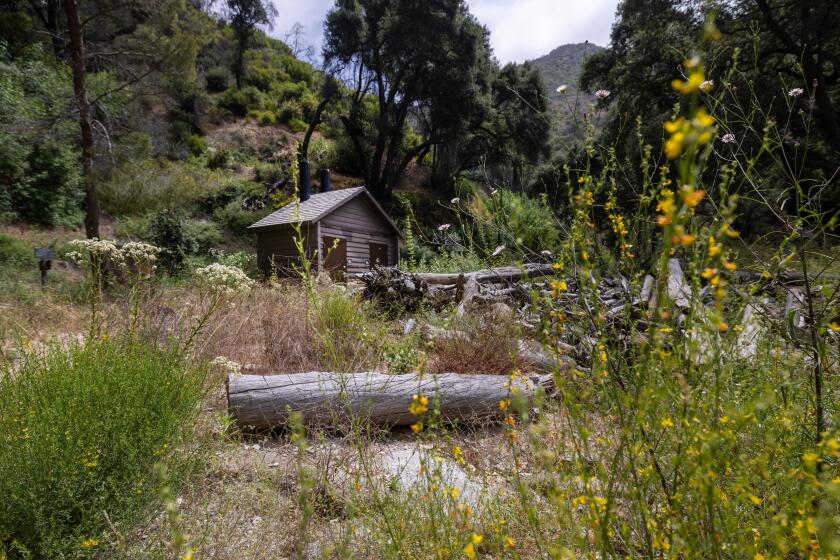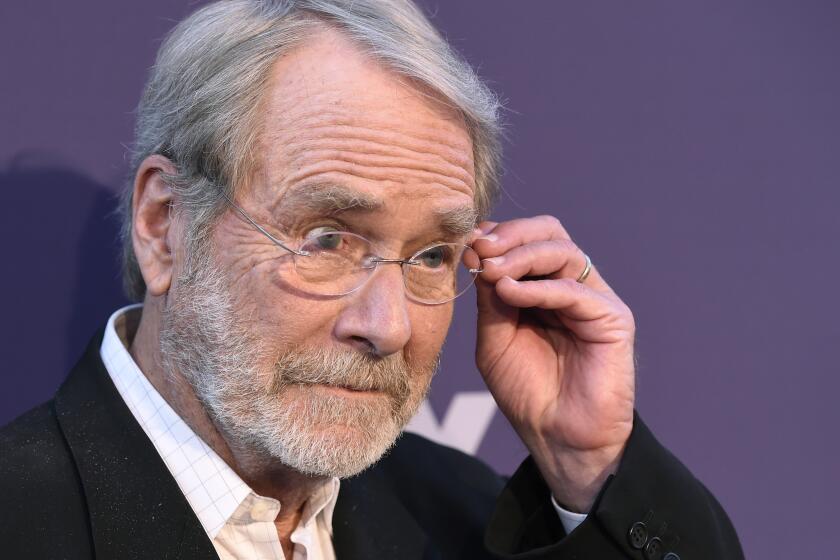Commentary: A winter darkness concert series? Think Joshua Tree moon music and an L.A. sound bath
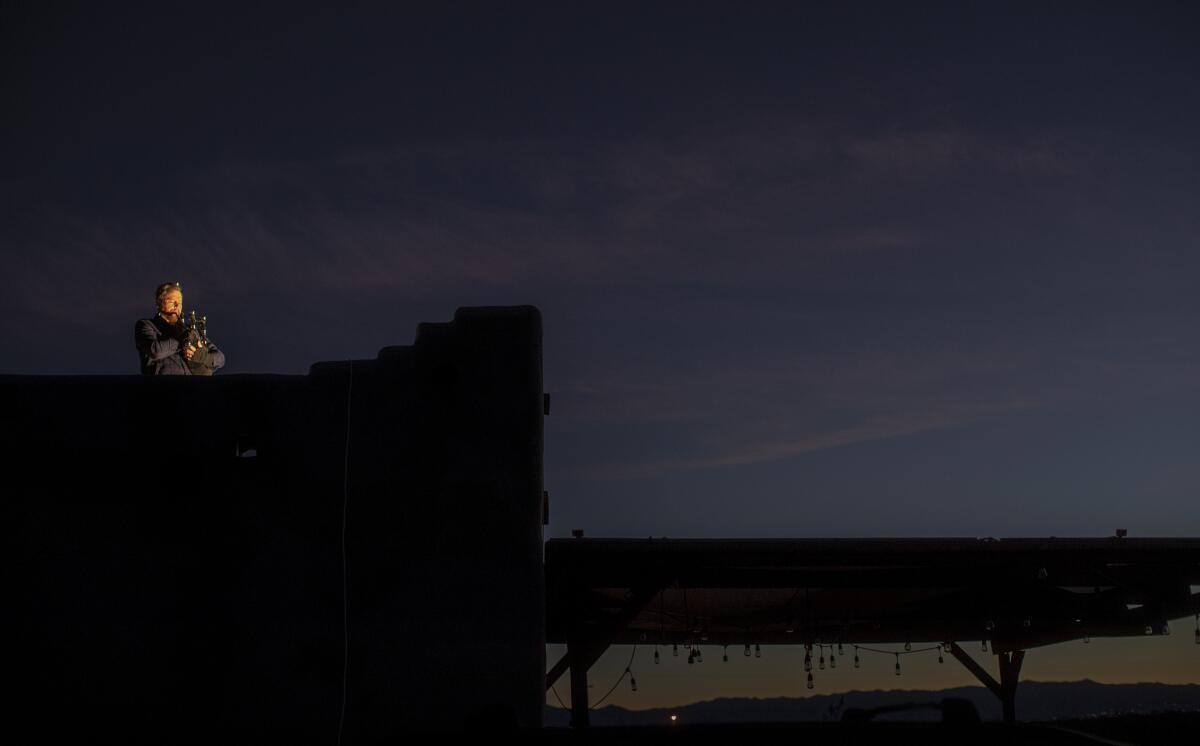
The year-end lists are in; 2019, neatly wrapped up. Once upon a time, Beethoven’s birthday (the indestructible composer turned 249 on Monday) traditionally was an artistic no-news period. But not this year in classical music.
Not here, anyway, thanks to Wild Up, which is wildly up to its usual reinvention — innovation being too tame a word for this extraordinary collective — with a “darkness sounding” series. Wild Up’s message is that the shortening of days calls for special fanfares, and on Thursday night the group began by stunningly drumming down the sun and strategically bagpiping up the full moon in the Joshua Tree desert. This was the first of 11 concerts through Jan. 19 of “mindful music during the darkest days of the year.”
The sun, though, was still shining, the temperature mild before the desert chill set in, as a small audience milled around the back of a remote small house, munching on tortilla chips and dip, drinking home-brewed beer before darkness, indeed, sounded. “What would a December show be?” Christopher Rountree, Wild Up’s founder and music director, wondered. The ensemble has been getting increasingly more impressive gigs and just performed the previous week as the orchestra for a Center for the Art of Performance at UCLA presentation at the Ace Hotel.
But for Rountree, the calendar now called for the communal. “The sad time of year,” he said, seemed ripe for “making music in the dark about the dark, embracing ritual, nature, space, listening and simply being together.” Indoors or out, the concerts are all in small spaces and meant to be intimate, welcoming events and open to all.
The most elaborate will be “solstice sounding, dusk til dawn,” drones played by virtuoso musicians at Human Resources Los Angeles in Chinatown, from 4:30 p.m. Saturday until sunrise Sunday, the longest night of the year. Other events include recitals and four Satsangs, or spiritual discourses, that might be sound baths (more about that later), readings of parables and conversation. From the first three engrossing programs, like nothing else anywhere else, winter in L.A. is not a new-music oxymoron.
The “Desert Moon” opener began with percussionist Booker Stardrum in a spectacular improvisation on traps connected to some electronic equipment as the audience stood or sat watching the last embers of the sun and then the sky as it turned lascivious orange. After that, a remarkably resourceful bassoonist, Archie Carey, whimsically addressed the moment. The chairs we sat on, he had made. The small Creosote House behind us, accessible by a couple of miles of dirt road, he shares with his wife, vocalist and voice-bather Odeya Nini, and their young son. Carey had even brewed the flavorful beer. Mainly, though, he came up with an arresting bit of performance art.
As he took the mouthpiece out of his bassoon case, a computerized voice read him the riot act on his phone. “What are you going to do with that bassoon?” it asked. “You know it’s too cold to play outside, right?” Best to lip sync to a recording of the bassoon solo that begins “The Rite of Spring,” the phone recommended, which Carey did against an incredible red-orange solar backdrop.
Enough was enough. Carey buried the phone in the sand, and then he attached the mouthpiece to what looked like piping left over from a plumbing job, honking at the dying radiant rays of setting sun. He handed out rattles made from screws and nuts, and we ritualized the last light, hoping the rattlesnakes weren’t listening.
For the moonrise, trombonist Matt Barbier stood on the roof playing a bagpipe drone. The moon, as though in a cosmic strip show, hid behind a cloud, a small red segment peeking through.
Inside, Nini gave a short demonstration of the sheer power of her vocal prowess, reaching notes deep as the earth and reaching twinkling harmonics meant for dog’s ears.
The next night, pianist Richard Valitutto gave the West Coast premiere of “SOVT,” an hourlong piano piece by Sarah Hennies, who describes her work as “concerned with a variety of musical, sociopolitical and psychological issues including queer and trans identity, love, intimacy, psychoacoustics and percussion.” “SOVT” only covers the last three. The setting was CalPercLA, a percussion warehouse in Frogtown.
A baby grand had been prepared by placing adhesive strips across some of the strings. It was lightly amplified, so as to give prominence to sympathetic resonances of the strings. SOVT stands for semi-occluded vocal tract, which is what happens to the voice when you suck on a straw, reinforcing the vocal cords.
In this case it is the piano chords that get reinforced through mesmeric repetitionm, which produces a host of sound effects that you would otherwise expect to come from an electronic arsenal. The piece is just that, one astonishing acoustical accomplishment after another, possibly in search of a composer, but capable of holding your attention by themselves. Valitutto’s intense, focused performance was spellbinding.
Sunday was Nini’s sound bath at Craft in America on West 3rd Street. Given blankets, we laid down on the hard, cold concrete floor in one of the two adjacent rooms, which were darkened. We were instructed to close our eyes and remain still and silent, while for 80 minutes Nini roamed, droned, bowed Tibetan bowls, rang gongs and otherwise attempted to transport us into our inner beings. If you fell asleep, no problem. If you snored, you could expect to be gently awakened.
This is very personal, and I was certain it didn’t work for me. The floor was freezing. It carried, like a wire, the sounds of traffic outside, which too often drowned out Nini. When she was loud and nearby, the experience was great. When she wasn’t, she seemed to take her magic with her. Only later did I realize that had I sat up, I would have been warm and the ambient noise much less.
But then the strangest think happened. Walking outside into frigid night air, I was no longer cold. After reaching my car, without thinking, I took surface streets rather the much faster freeway. It didn’t even occur to me to turn on the radio.
The night before I had heard Daniil Trifonov give an unforgettable performance of Tchaikovsky’s First Piano Concerto with the Los Angeles Philharmonic conducted by Michael Tilson Thomas. The sensational young Russian pianist played the orchestra’s old Hamburg Steinway concert grand, which sat unused for years until it was restored last year. The absorbing sound Trifonov got from it seemed to enter a listener’s every pore as effectively as Nini’s sound bath.
As I drove past the Steinway showroom on Wilshire, I could swear I heard it again and kept hearing it for another mile or two. The sound bath must have worked after all.
No, it’s not over yet. WasteLAnd, the compelling new-music ensemble, will present its own “A Winter Wasteland” for the solstice Friday and Saturday nights at Art Share L.A. downtown.
Beyond that, the year’s two most notable new operas both have December premieres and reach us via webcasts this week and next. Olga Neuwirth’s attention-getting “Orlando,” a provocative study in androgyny by one of Europe’s most original composers and someone featured at this summer’s Ojai Music Festival, streams for two days beginning Wednesday on the Vienna State Opera’s website. On Dec. 28 Bavarian State Opera will stream (and archive for a month) on staatsoper.tv the English-language premiere of the discomfiting Danish composer Hans Abrahamsen’s wintery “The Snow Queen,” starring Barbara Hannigan, last summer’s sensational Ojai festival music director.
More to Read
The biggest entertainment stories
Get our big stories about Hollywood, film, television, music, arts, culture and more right in your inbox as soon as they publish.
You may occasionally receive promotional content from the Los Angeles Times.
